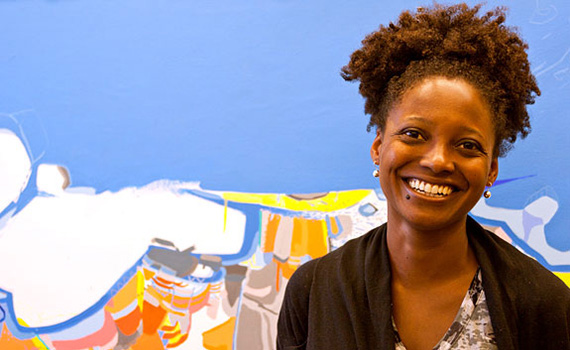French philosopher Pierre Hadot believes that an ancient philosopher wasn’t someone who wrote masterpieces, but who lived philosophy as a way of life. Likewise, is a poet who lives a life of poetry. Her experiences, observations, and even her favorite singer have become her source of creation.
Last Wednesday, students, professors, and community members filled Persson Auditorium for Smith’s poetry reading — introduced by English professor . She read an excerpt from her forthcoming memoir, Ordinary Light; poems from her published collections, including the Pulitzer Prize–winning Life on Mars; and a poem she was asked to translate from Chinese.
Family memories inspired many of Smith’s works. Her mother died from cancer shortly after Smith graduated from Harvard, and “that trauma was something that I’ve written about quite a lot,” she said. The death of Smith’s father, who was an engineer working on the Hubble Space Telescope, spurred her third book, Life on Mars. “Thinking about space as a real place helped a lot in dealing with that grief,” said Smith, who is a creative writing professor at Princeton.
Smith explained that she “stole” the title of Life on Mars from musical artist David Bowie. She said she loves the fact that Bowie “does think about life on Earth and the distances and the heartbreak of that.”
The name of her second book, Duende, came from the Spanish poet Federico Lorca. Ever since Smith was a student, Lorca’s concept of duende — which she defined as “a passionate and relentless, and potentially destructive creative energy that the artist is seeking to unleash from within,” fascinated her. A trip to Spain and her divorce furthered this idea for Smith, so many of the poems in this book are different metaphors for “that same struggle as duende,” she said.
The event concluded with a Q&A session followed by a reception where students further interacted with Smith.
As she wrote in her memoir, “I wanted to write the kinds of lines that I carried from moment to moment on a given day without even having chosen to.” And Smith has lived that out.

